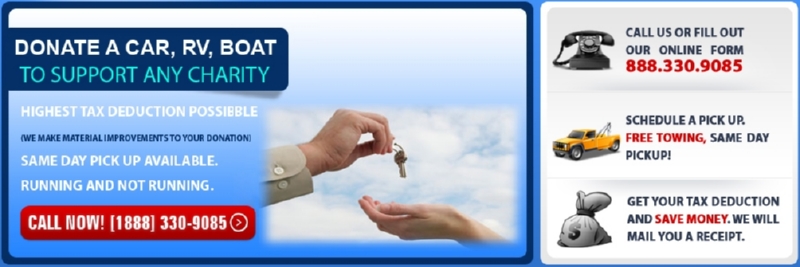 Here’s the catch: Your generous spirit moves you to help someone in need. You see an ad forAmerican
Charity Center (ACC) offering to accept your vehicle donations, whether it runs or not, in support of a charity of your choice. They claim you’ll receive the highest tax deduction for your car donation and a vacation certificate for your generosity. You
arrange to have them tow your old '76 Chevy for free. Unfortunately, your good deed never reaches its destination because ACC isn’t authorized to accept donations on behalf of charities and you won’t be able to write off the donation on your taxes.
Here’s the catch: Your generous spirit moves you to help someone in need. You see an ad forAmerican
Charity Center (ACC) offering to accept your vehicle donations, whether it runs or not, in support of a charity of your choice. They claim you’ll receive the highest tax deduction for your car donation and a vacation certificate for your generosity. You
arrange to have them tow your old '76 Chevy for free. Unfortunately, your good deed never reaches its destination because ACC isn’t authorized to accept donations on behalf of charities and you won’t be able to write off the donation on your taxes.
For years ACC, headed by Joseph Blanco, has offered to accept car, boat, RV, and trailer donations to help out charities and other organizations. They advertise they’ll recondition the donation, if possible, so it can be resold for the maximum profit which
can be written off as a tax deduction. They boast testimonials from well-known charities such as St. Jude’s, Catholic Charities, and American Diabetes Association. Sadly, after contacting these organizations, we found the charities don’t use ACC to handle
their vehicle donations, and they hadn’t heard of them, let alone received any funds from them to help their causes.
The principals also operate the following entities: Caring Cars, Inc., Give-org, Karing Kars 4 Kids, National Charity Support, and RVDonations.com, to name a few, which have all earned F ratings with Business Consumer Alliance (BCA). Some of the contributing
factors to the ratings include a pattern of complaints alleging misrepresentation and false claims, unanswered complaints, and failure to obtain registration as a commercial fundraiser. Commercial fundraisers are generally paid by a charity to raise money
on the charity's behalf. In California, the Attorney General oversees commercial fundraiser activities and these entities must obtain a $25,000 bond and meet all registration requirements. Despite being notified by the agency several times of their need to
be registered, dating back to 2010, ACC isn’t registered. BCA has also written to ACC requesting proof of registration, or a notice of exemption, which they have not provided.
The complaint allegations are serious. One giver stated her charity never received any funds from the sale of the RV she donated through ACC, and she received a fake tax receipt. While the majority of complaints center around misrepresentation of the vehicle
advertised on eBay, and claims that the vehicles are inoperable or in need of extensive repairs that aren’t previously disclosed, the company denies that they sell or participate in any form of vehicle sales. Yet, their website,advertisements,
and responses to complaints, contradict this claim. Joseph Blanco has a history in the automotive industry and is linked to auction services and car clubs.

It is not uncommon for auto auctions and dealers to advertise as fundraisers for charities. Unfortunately, when many do, they are not out to help those in need. Instead, they are looking to increase their inventory and oftentimes pocket the proceeds from
the vehicles they sell. Not only does the charity not receive assistance, but the giver may find that their donation doesn’t qualify for a deduction if the receipt they receive is not from a recognized 501(c)3, or if the charity never receives funds. Also,
while a company may claim you can deduct the vehicles full fair market value, what they don’t reveal is if the donation doesn’t meet specific criteria, the amount you can claim may be far less. In addition, the deduction amount is lowered if you receive any
incentives for your donation, like the vacation ACC offers. The incentive can end up costing you money or have conditions that you have to meet in order to redeem them.
Kim’s advice: While your intentions to help the needy are worthy, beware—not everyone shares the same objective. Bear the following in mind when considering making a donation:
- Research the organization before making a donation. Search for charities on theIRS website or call their customer account services division. Remember, churches and other religious
organizations are not required to be registered with the IRS, but may be able to receive tax-deductable contributions.
- Check to see if the company offering to accept your donation is a third party. Verify with your state officials, typically thestate attorney general’s office, if the company needs registration.
- Find out what will happen to your donation and how much of the proceeds will go to helping the needy. Some charities only receive a small portion of the profits, some as little as 10%.
- If possible, donate directly to the charity. Perhaps choose a local charity that uses the vehicles to provide transportation to the needy or gives them to families without transportation. Doing so may yield a higher tax deduction.
- Sign the title and make a copy for your records before you release the vehicle. Obtain a receipt from the charity. Make sure the representative signs the release. Follow-up with your local authority to ensure that the title is
released from your name so you aren’t held accountable for accumulating taxes, fees, or liabilities.
Being armed with this information may drive home the fact that when properly handled, your vehicle donation can go a long way to help those in need.
Kim Burge is Business Consumer Alliance’s Vice President of Business Practice. For media inquiries, Kim can be reached by phone at (909) 835-6094.